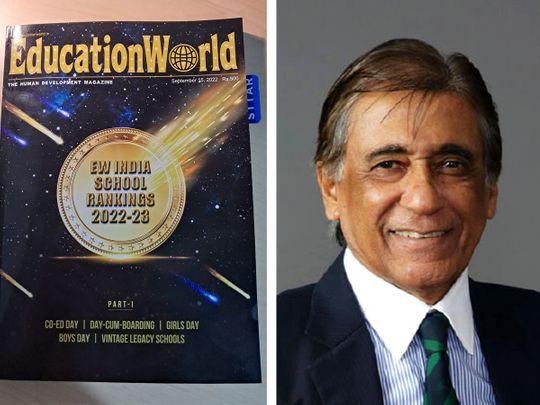
This column occasionally features inspiring leaders and the stories of those who are working to transform India. Education World, India’s leading magazine and media portal for education, from pre-nursery, all the way to post-PhD, is one such story.
Their annual rankings for the best schools, colleges, engineering institutes, and universities are widely used and respected. Their annual awards, international conferences and symposia, as well as training workshops and policy initiatives, are also well attended and influential.
The National Education Policy (NEP), for instance, reflects several of the issues, themes, and recommendations earlier listed and flagged by Education World.
Being a life-long student and teacher, I was quite keen to meet the folks behind this venture. Dilip Thakore is the extraordinary editor-entrepreneur who launched Education World and D.T. Media & Entertainment Pvt. Ltd., the company that owns Education World.
This column is, in large measure, about him. We had last met in Goa over twenty years back, along with other influencers, to promote the free market and economic globalisation in India.
A man of many parts
Dilip, a long time Mumbai resident, was packing his bags to launch Education World and start a new life in Bangalore. He and his business partner and wife, Summiya Yasmeen, staked everything to start Education World when Dilip was already in his fifties. I discovered that Dilip was not only my school senior by several years, but also a London returned barrister.
His family had owned huge farms in East Africa, running into thousands of acres, which they lost in the political turmoil. Dilip began to practice in the Bombay High Court as a Bar-at-Law way back in 1968. But, after a short stint, he was lured away to a lucrative executive position at Rallis India in 1971.
This highly-coveted “boxwallah” job would have difficult to give up, but Dilip took up the challenge of starting India’s first business magazine in 1977. The fortnightly, called Business India, with Dilip as its founding editor, was owned by Dilip’s friend and former colleague at the Bar, Ashok Advani.
The magazine was a huge success. Dilip not only hobnobbed with India’s business and industry greats, but also led the charge against what Dilip termed the “inorganic Soviet-inspired neta-babu socialism.”
In those days, globalisation was practically unheard of; liberalisation an expletive. Indian intellectuals and economists, mostly of a Marxist bent, spent enormous time and energy attacking free markets and painting doomsday scenarios of what would happen if India opened up. In the meanwhile, China, under Deng Xiaoping, had already stolen a march over us.
So successful was Business India, that after 66 issues and over 50 path-breaking cover stories, Dilip was invited in 1981 by one of India’s largest media houses, Ananda Bazar Patrika (ABP) Group, to start its rival, Business World. It was typical of Dilip’s unusual, some might say charmed life, that the breakthrough deal was closed during a 40-minute drive to the Mumbai airport with ABP supremo Aveek Sarkar.
Dilip internationalised the magazine with a tie-up with Financial Times, London. He even managed to get a monthly column by the legendary Lee lacocca, who’d turned around Chrysler from bankruptcy.
From strength to strength
Dilip’s career graph at Business World went from strength to strength, but he didn’t last with ABP even a full decade. When he quit, in 1987, liberalisation was just around the corner.
With all his hard work, 166 issues and over 100 cover stories, he was justifiably proud that he and his crusading publications had, in no small measure, contributed to it. But, fate reveals itself in unexpected twists and turns. Though Dilip had survived the end of his “open marriage” with the famous theatre-personality and broadcaster, Dolly Thakore, his career was now headed south.
He edited Playboy’s poor Indian cousin, Debonair, for a year. The magazine, in which I myself have published, was neither as scandalous nor pathbreaking as its original. India was too staid for that.
Dilip moved on to a much quieter stint at Datamatics Group, where he lasted a good eight years. Then he quit everything, sold his assets, and moved to Bangalore, driven by the mission “to make education the No 1 item on the national agenda.”
His partner, Summiya Yasmeen, supported him, both emotionally and financially, through this difficult transition. After a testing initial stint in which Education World made no money and Dilip was on the brink of losing it all, Lady Luck, once again, smiled on him.
Reaching the summit
An American billionaire became interested in his startup—before the word was invented—and bought 26% of his stock. With fresh capital infusion and their smart CEO, Bhavin Shah, Dilip and Summiya once again reached the summit.
When I reached out to Dilip, quite naturally, he couldn’t immediately place me. I wasn’t surprised, let alone offended. It is for juniors to look up to seniors, not the other way round.
But once he remembered, he not only met me at short notice, but loaded me with free back issues of Education World and a lavish coffee-table tome on India’s 21st most influential educators.
India’s education sector, which is growing by some 30 million new learners each year, is probably the biggest in the world. Under the present Narendra Modi led regime it is also poised for an unprecedented take-off.
Education World, as the market leader, has positioned itself well both to contribute to this crucial sector, as well as benefit by its expansion.
Last year, Dolly, Dilip’s ex-, came out with her tell-all autobiography, Regrets, None. It is time Dilip told his story too. Not only his contribution to India’s liberalisation and his romantic second innings with Summiya Yasmeen, but also his amazing turn-around as an entrepreneur businessman and publisher much later in life.
In the meanwhile, after their great success in India, I would like Education World to take their rankings of schools out of India, especially to places like UAE and Singapore, where a large number of Indians reside.












